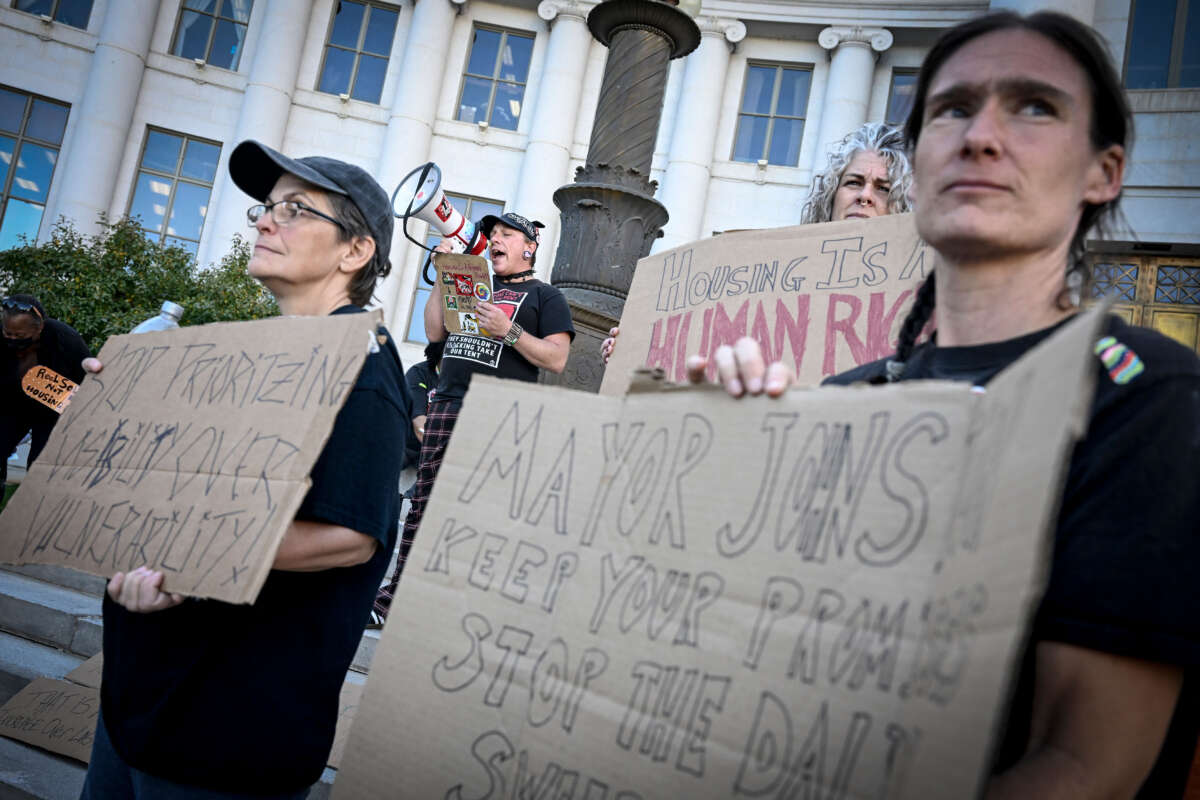In the first veto of his mayoral administration, Denver Mayor Mike Johnston (D) vetoed a city council ordinance on Friday that would have prevented city officials from carrying out “homeless sweeps” in below freezing weather.
“He has sentenced houseless people of Denver to more sickness, suffering, loss of limbs, and potential death,” Housekeys Action Network Denver (HAND), an advocacy organization composed of people who are currently or have previously been homeless, said in a statement.
On February 3, homeless advocates braved the snow to protest the mayor’s veto at City Hall, asking the Denver community to contact city council members who initially opposed the measure and urge them to reconsider and vote in favor of the ordinance. City council members will vote to overturn the mayor’s veto on February 12.
“February 12th there will be a re-vote,” HAND said on social media. “Email all 6 council members who voted NO tell them why vote YES.”
In 2023, rates of homelessness in the Denver metro area increased a staggering 32 percent, leaving over 9,000 people in the region without permanent housing. Additionally, between 2022 and 2023, the number of “unsheltered” people, or people who sleep in cars or tents in public spaces, grew 33 percent, amounting to more than 7,000 people. According to Denver Rescue Mission, homelessness in Denver is increasing because of a lack of affordable housing and other complex issues like chronic health conditions, domestic violence, and job loss.
The moratorium on homeless sweeps in freezing weather is vital to ensuring that unhoused community members do not suffer exacerbated health morbidities caused by freezing temperatures.
“The intensity and duration of their exposure to cold substantially increases risk of injury and mortality,” Megan Gaydos, Bridging Project Director at Human Impact Partners, and Juan Roberto Madrid, president of the Colorado Public Health Association, said in a 2022 letter to the Denver City Council. “In fact, researchers have found excess mortality due to cold-related injury among houseless individuals compared to the general population — for example a prior cold-related injury such as frostbite, hypothermia, and immersion foot increases the odds of death by almost seven times.”
During homeless sweeps, unhoused people are forced to pack their belongings in the cold, often getting themselves and their possessions wet in the snow, putting them at further risk of harm. In fact, April research by Colorado scholars found that police sweeps of homeless encampments could increase deaths among unhoused people by 25 percent by 2028.
“[Sweeps,] we predict, will contribute up to 25 percent of the deaths among this population over a 10-year period,” Dr. Joshua Barocas, the principal investigator of the study and infectious disease doctor and associate professor at the University of Colorado Anschutz Medical Campus, told Denverite in April. “To put that a different way, it means our states and our cities are literally killing people with this.” Dr. Barocas is a supporter of the city ordinance and, in November, told Denver City Council’s Safety and Housing committee that cold weather begins to pose risks of bodily harm under 32 degrees.
City policies toward unhoused people, like homeless sweeps in freezing temperatures, result in a measurable loss of lives. In 2022, 226 unhoused people in Denver died, constituting 1 out of every 21 unhoused persons in the city. In addition to high mortality rates, homeless people in the Denver metro area also face risks to their health that can land them in the hospital. According to the Common Sense Institute, unsheltered individuals sought medical attention at Denver Health an average of four times annually, likely due in part to injuries resulting from freezing weather conditions.
“Freezing sweeps coerce people into dehumanizing and very temporary situations after the trauma of forced displacement,” Z Williams, Director of Client Support and Operations at Bread and Roses Legal Center, told Truthout. “The only reasoning I can see for the Mayor’s veto is that he wants to erase homeless people instead of doing something meaningful to ensure every person in Denver has safe, dignified, and long term housing.”
Media that fights fascism
Truthout is funded almost entirely by readers — that’s why we can speak truth to power and cut against the mainstream narrative. But independent journalists at Truthout face mounting political repression under Trump.
We rely on your support to survive McCarthyist censorship. Please make a tax-deductible one-time or monthly donation.
